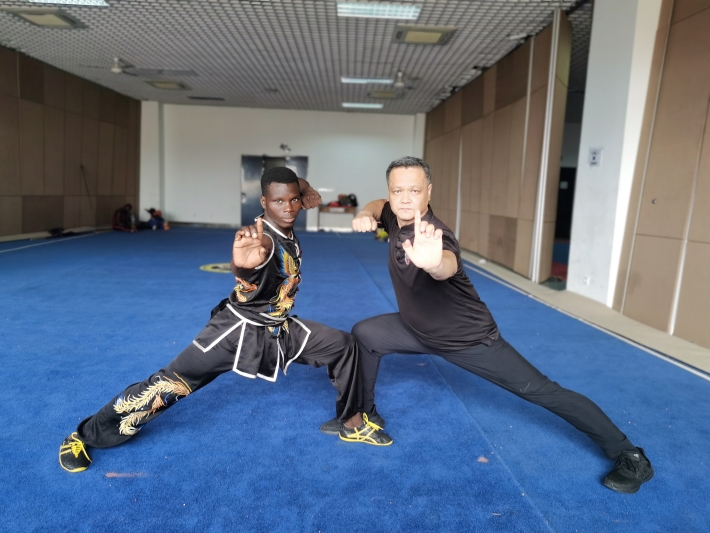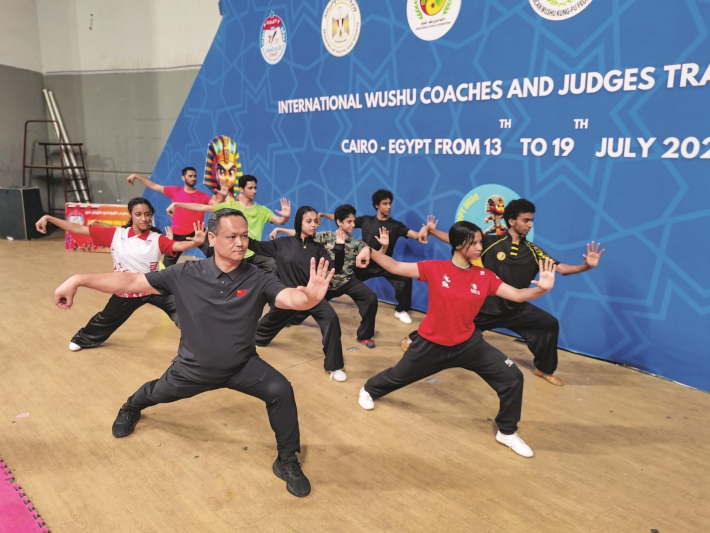|
||||||||||
| Home Top News Economy/Tech Culture/Sports China in Foreign Eyes Green Development Videos Intangible Cultural Heritages |
|
||||||||||
| Home Top News Economy/Tech Culture/Sports China in Foreign Eyes Green Development Videos Intangible Cultural Heritages |
| ChinAfrica |
| Hearts of Lions, Souls of Dragons |
| Visit to Africa by a delegation of wushu trainers strengthens friendship between peoples through wushu |
| By Li Xiaoyu | VOL. 16 September 2024 ·2024-09-02 |

Zhou Qingjie, a professor, practises Nanquan with Ousmane Gueye, a famous Senegalese wushu athlete in Dakar, Senegal, on 5 July (COURTESY)
In Niger, a country at the southern end of the Sahara Desert, the announcement of the arrival of wushu teachers attracted a large number of people from near and far, despite a tiring journey. Curious and covetous glances testify to the attraction of this oriental culture.
In his welcoming speech, Amadou Garba Abdourahamane, president of the Nigerien Kung Fu Wushu Association, said with great emotion, “The first visit of the wushu coaching team to Niger is proof of the positive development of our bilateral relations. Each coach is not only a wushu expert, but also an ambassador of cultural exchange between the two nations.”
For his part, Chinese Ambassador to Niger Jiang Feng emphasised the importance of wushu for cultural exchange. He encouraged Nigeriens and people from all walks of life to consider the art as a means of promoting exchange and mutual inspiration between civilisations.

Zhou Qingjie, professor and director of the Sports Exchange and Research Centre at China Foreign A airs University, practises Taijiquan with some Egyptian fans in Cairo, Egypt, on 17 July (COURTESY)
Timely lessons
In recent years, wushu has developed strongly on a global level. Its internationalisation has reached a new level since 2020, when it was officially recognised as a competitive sport at the fourth Summer Youth Olympic Games (YOG), to be held in Dakar, Senegal, in 2026.
With the aim of raising the level of wushu competitions in Africa, a delegation of Chinese coaches visited Senegal, Niger and Egypt from 2 to 19 July. Led by Li Yongqiang, deputy director of the Wushu Management Centre of the General Administration of Sports of China, the team was made up of top coaches and college experts. Despite the particularly hot weather conditions, these experts were able to pass on their knowledge to the African enthusiasts with great professionalism and rigour. Wushu classes, including Changquan, Taijiquan, Nanquan, Sanda and short weapons, were organised for local athletes and enthusiasts, who welcomed the lessons with enthusiasm, eager to get to grips with the essence of wushu.
The Chinese coaches were particularly impressed by the professionalism and seriousness of the Egyptian participants. Egypt is an important pillar of wushu in Africa. In 1990, the first African Kung Fu Wushu Federation was founded in this North African country, which now has more than 600 clubs and around 70,000 practitioners.
Mahamed Kamel is one of them. He runs two Taijiquan centres in Cairo, where he teaches over 100 students. He pointed out that this training camp is particularly timely as Egyptian athletes prepare for the upcoming Junior Wushu World Championships and the Dakar 2026 Summer YOG. “Thanks to the advice of the Chinese experts, the Egyptian coaches and athletes have significantly improved their level of training,” he told ChinAfrica.

A Chinese wushu teacher trains his students in Dakar, Senegal, on 6 July (COURTESY)
Cultural significance
During this visit, the Chinese delegation held the first China-Africa Cultural Forum dedicated to wushu on the African continent. Participants expressed their appreciation for this initiative, which provides a better understanding of the cultural richness of wushu. Zhou Qingjie, professor and director of the Sports Exchange and Research Centre at China Foreign Affairs University, presented the rich and unique aspects of wushu, highlighting its concept, its link with kung fu and the philosophy behind it. His presentation greatly enriched the participants.
The interactive session of the forum was particularly engaging. Many of the African amateurs had a perfect command of Bruce Lee’s films, evoking emblematic scenes with ease. Their passion for wushu resonated deeply with the Chinese coaches. Zhou took the opportunity to explain its philosophy, which is based on the values of peace, love and harmony. “Wushu is not an art of violence, but rather a means of preserving peace and defending oneself, while showing a deep respect for life,” he explained.
To illustrate this vision, he introduced the traditional wushu salute. This symbolic gesture, made with the left palm covering the right fist, expresses respect, signifying the ability to defend oneself while being aware of the importance of doing so properly. Zhou was pleased to see that local athletes were already adopting this gesture as a sign of respect.
He believes that wushu conveys a view of the world that is specific to Chinese culture. Indeed, many movements in wushu are imbued with symbolism, such as the boxing styles of Praying Mantis, Monkey, Eagle, Snake and Tiger. “This illustrates Chinese philosophy, which advocates learning from nature and the quest for harmony between man and nature,” he pointed out.
Fruitful cooperation
The Dakar Action Plan (2022-2024) unveiled at the Eighth Ministerial Conference of the Forum on China-Africa Cooperation, states that China and Africa are committed to promoting cooperation and exchanges in the field of sports, while strengthening their partnership through mutual support for sports events organised on both sides. The delegation of wushu coaches is one of the concrete initiatives in this plan. According to China’s Ambassador to Senegal Xiao Han, sports exchanges will become a key priority for China-Senegal cooperation in the coming years. The two sides are currently working closely to host the 2026 Summer YOG in Dakar. To support the bid, China has already renovated and developed eight sports facilities in Senegal.
As sports exchanges between China and Africa have increased, so has the popularity of wushu among African amateurs, as Hamidou Tahirou can attest. The 52-year-old employee of the Office of Subsistence Products of Niger began practising Shaolin kung fu in 1986. In 1999, he founded his first kung fu club in Liberia, where he has played an active role in promoting Shaolin martial arts. In 2019, he was sent to the Shaolin Temple by the Nigerien Kung Fu Wushu Federation to participate in a three-month training programme. This summer, he also participated in the training by the Chinese delegation. He hopes that exchanges and cooperation between China and Niger in the field of wushu will continue and lead to even greater success.
|
||||||
| About Us | Contact Us | Advertise with Us | Subscribe |
| Copyright Beijing Review All rights reserved 京ICP备08005356号-5 京公网安备110102005860号 |